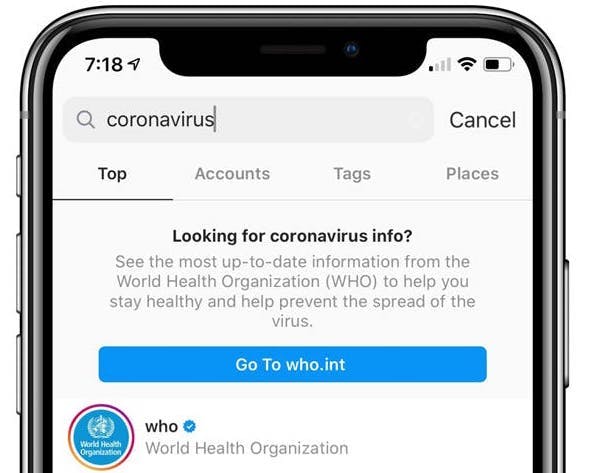The Danger of Misinformation
Tens of thousands of Facebook users have shared videos claiming garlic and onions as a miracle remedy for warding off the new coronavirus – a myth debunked by the World Health Organization (WHO). In Britain, an internet rumor linking the coronavirus to 5G wireless technology led to several incidents of people burning down cell towers. In Iran, hundreds died from drinking methanol after reading circulated messages on Farsi social media accounts saying that others had cured themselves of the coronavirus with high-proof alcohol.
In an already challenging and rapidly evolving COVID-19 environment, finding accurate, reliable sources of information seems to be more difficult than usual, creating what WHO has called an “infodemic.” United Nations Secretary-General António Guterres called the spread of misinformation, “a poison that is putting even more lives at risk,” and launched a new communications response initiative to fight back with facts and scientific evidence.
Tech Companies Supporting Virus Efforts
Tech companies have been at the forefront of battling the pandemic. Facebook committed to matching up to $10 million of contributions to the COVID-19 Solidarity Response Fund – launched by the UN Foundation and Swiss Philanthropy Foundation to help WHO implement its COVID-19 global response – and Google is donating $2 for every $1 donated on its platform. As of April 16, Facebook has raised $5,731,553 on its platform, and Google has reached $1,673,689. Video-sharing app TikTok also contributed $10 million to the Fund.
These funds help WHO in many facets of the fight, including procuring and delivering essential supplies to health workers, and enhancing research and development for treatments and a vaccine.
Banding together, tech firms also faced the “infodemic,” answering concerns raised by the U.S. government and others, that disinformation was as dangerous as the pandemic.
Addressing Misinformation on Tech Platforms
Facebook has started directly removing content about the virus that may contribute to “imminent physical harm,” or makes “false claims about cures, treatments, the availability of essential services or the location and severity of the outbreak.” Recently, this included posts by Brazilian President Jair Bolsonaro touting hydroxychloroquine as a potential COVID-19 remedy. On Instagram, the company is filtering and removing COVID-19 content that is not posted by official health organizations.

“We know we’re not the experts,” said Facebook Chief Operating Officer Sheryl Sandberg in an interview with Yahoo Finance. “So right at the beginning of this, we went to the WHO and to the CDC, and health ministries, and said ‘Please help us. You tell us the facts that cause imminent harm that you want down, and we’re going to do everything we can to take them down.’”
Google is using its search engine to prominently highlight WHO information about COVID-19 in a special “SOS Alert,” drawing user attention to authoritative facts on symptoms, prevention, and most recent news on the virus. YouTube is also working to remove content featuring unproven quick fixes or virus treatments.
WikiHow, another Solidarity Response Fund supporter, is using its platform to highlight vetted content from WHO including detailed illustrations and instructions on how to properly put on a mask, and how to care for someone who may have the coronavirus.
Reports that teen users in search of additional “likes” were pretending to have the virus in TikTok posts have made the platform particularly rife with misinformation among this demographic. On the other hand, TikTok users have also helped raise awareness about proper hygiene with several viral hand-washing challenges that drew celebrities from Gloria Gaynor to Mariah Carey. Several doctors have also taken to the app to share their own perspectives from fighting the virus, and to just share a laugh during these tense times.
@drjcofthedcHit Your Baby Rollie! ##rightfootleftfoot ##fyp ##foryourpage ##onehandtwohandchallenge ##tiktokdoc ##viral ##masks ##fyp ##foryourpage ##foryou ##doyourdance♬ Hit Yo Rollie – ハハハハハ
Tech initiatives to battle misinformation in the COVID-19 world present a rapidly evolving, pressing front that can encourage responsible media consumption, enhance public trust, and allow those on the frontlines to focus on defeating the actual pandemic.
“Around the world, people are scared. They want to know what to do and where to turn for advice,” said UN Secretary-General Guterres. “This is a time for science and solidarity.”
Among the many donors to the fund, here are some of the tech companies that have stepped up to help the Fund: ADP, Apple, AWS, Bumble, Cisco, Facebook, Google, Hubspot, Intuit, LinkedIn, Microsoft, Qualcomm, SAP, Snapchat, Spotify, Twilio.org, Verizon, Workday, Xilinx, and Zoom.
donate today
Every donation makes a difference. Support WHO’s life-saving efforts to respond to the COVID-19 pandemic by giving to the COVID-19 Solidarity Response Fund. Donations made via Facebook will be matched up to $10,000,000. Through June 30, 2020, for every $1 you donate here, Google.org will donate $2, up to $5,000,000.



 View All Blog Posts
View All Blog Posts

